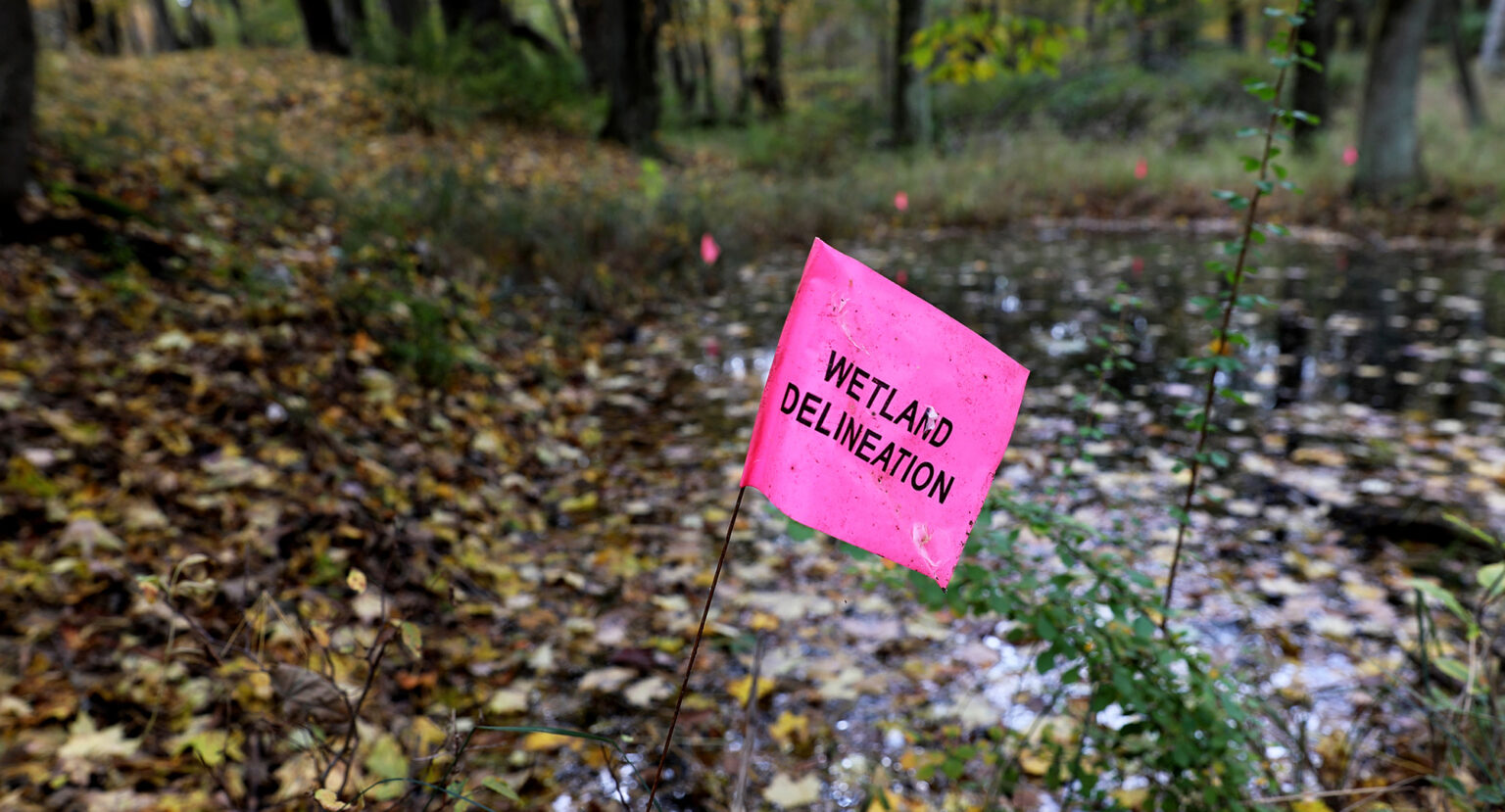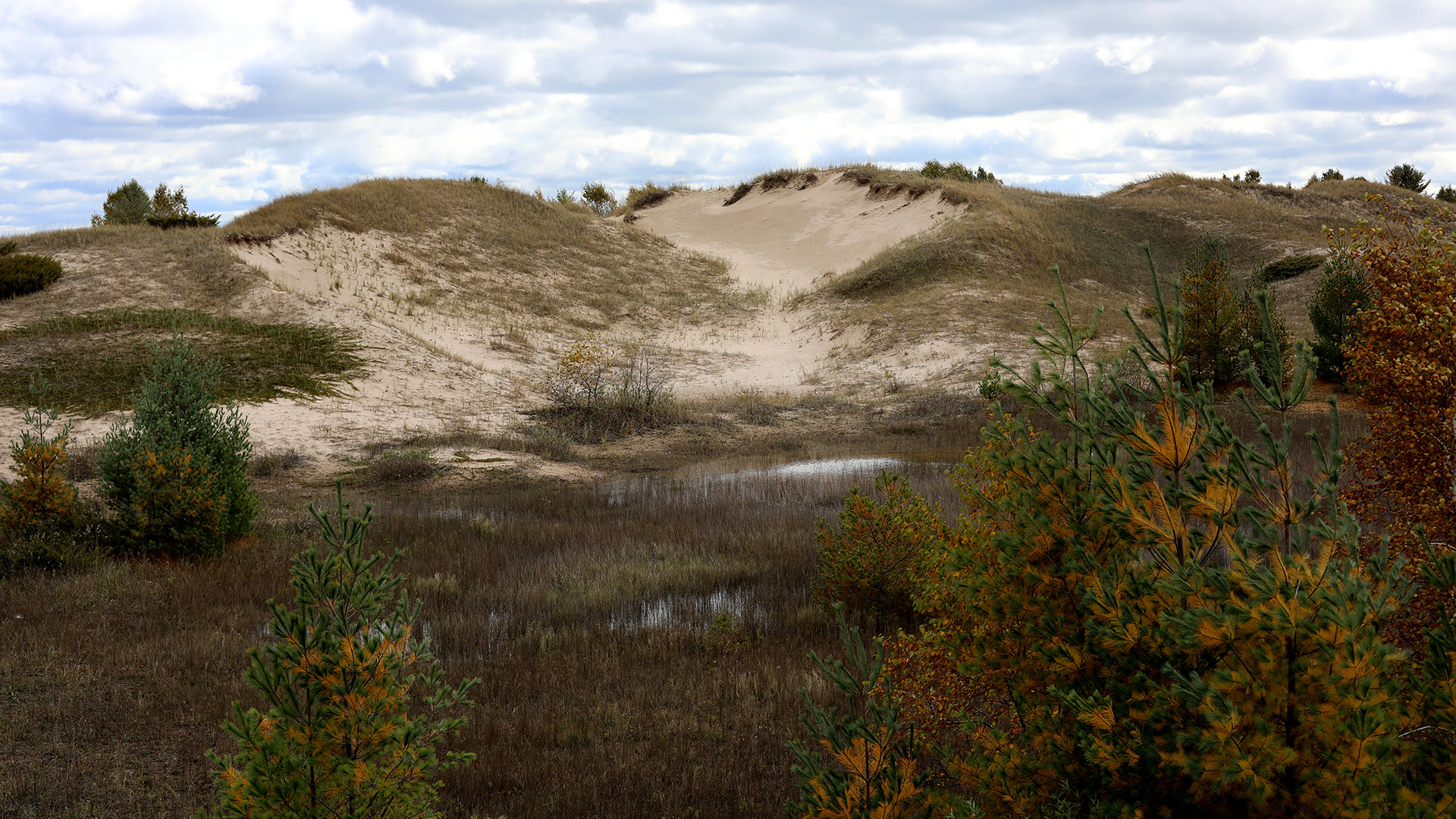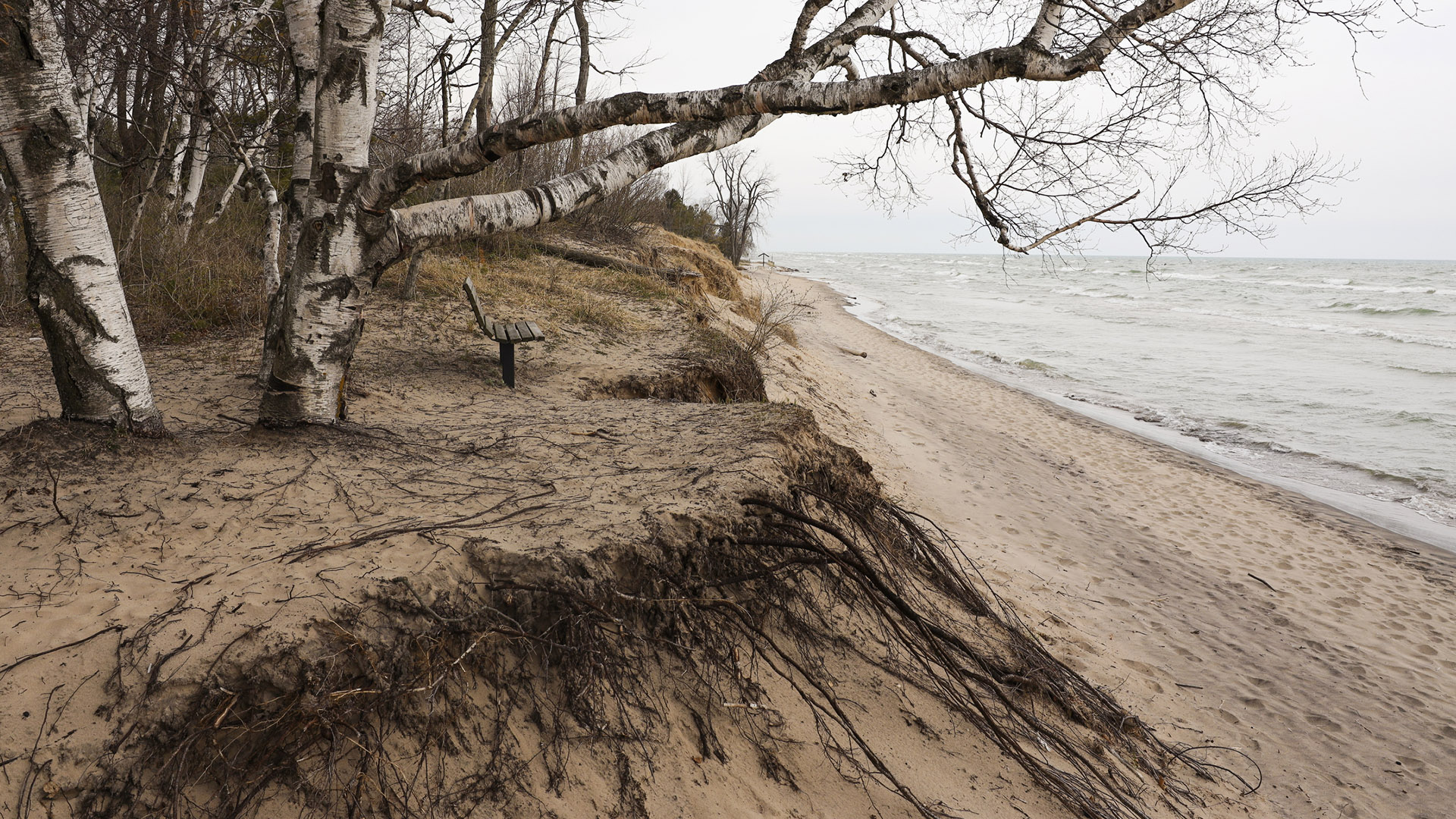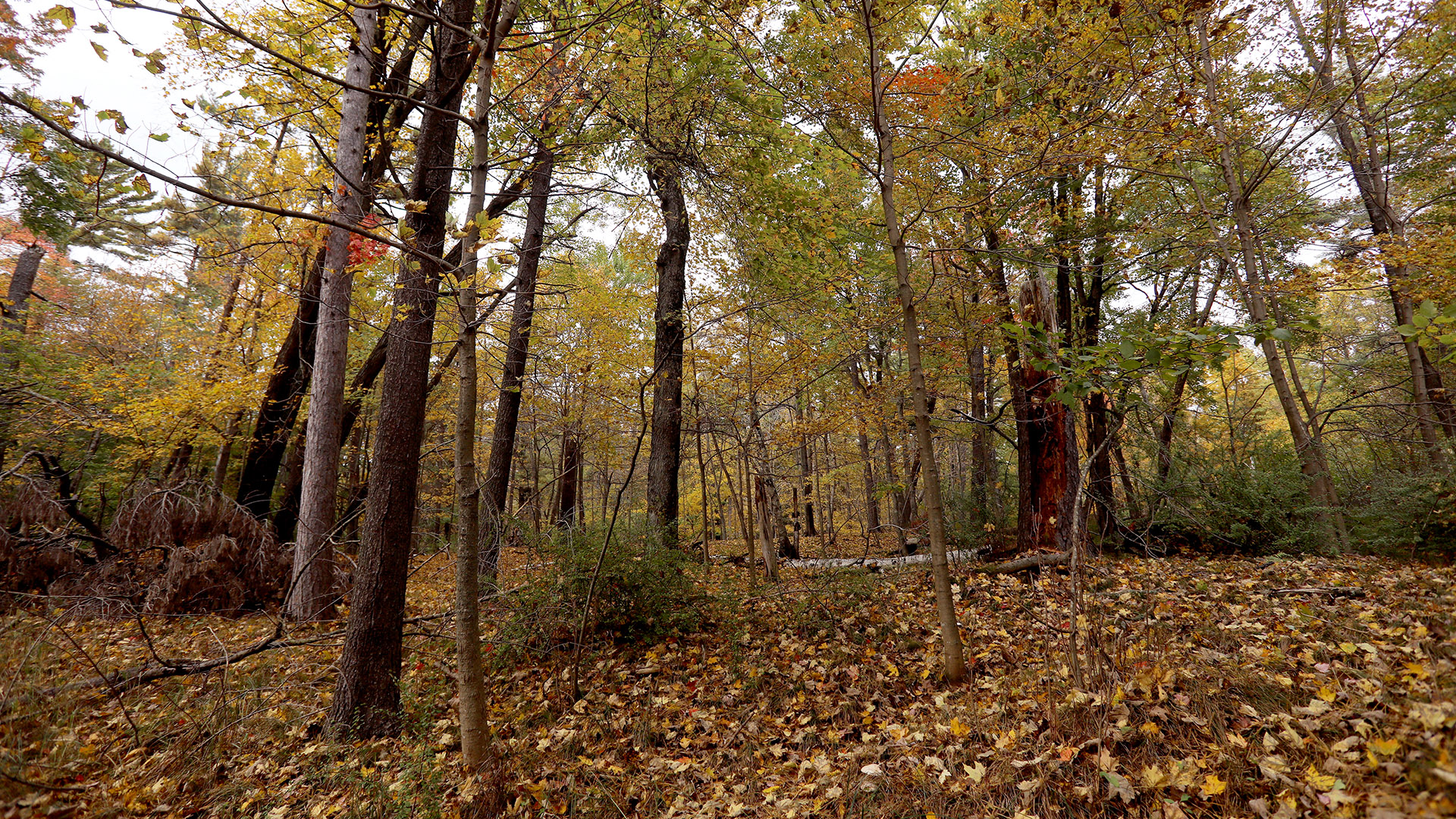Kohler Co. golf course plans along Lake Michigan dealt another setback
Opponents cheer a Wisconsin Court of Appeals decision finding fault with a controversial project's plan to fill wetlands to build a championship golf course next to Kohler-Andrae State Park.
Wisconsin Watch
January 10, 2024

A flag delineating a wetland is seen at the site of Kohler Co.'s proposed golf course along Lake Michigan in Sheboygan on Oct. 11, 2018. The Wisconsin Court of Appeals has upheld an administrative law judge's 2019 decision to rescind the company's state-issued permit to fill wetlands in developing the project. (Credit: Coburn Dukehart / Wisconsin Watch)

This article was first published by Wisconsin Watch.
The fate of Kohler Co.’s decade-long effort to build a championship golf course atop wetlands and forest in Sheboygan, Wisconsin, remains in question following a court ruling applauded by the project’s opponents.
The Wisconsin Court of Appeals in December 2023 upheld an administrative law judge’s 2019 decision to rescind the company’s state-issued permit to fill wetlands.
The ruling was the latest in a theater of legal battles over the proposed golf course, including several in which Kohler Co. prevailed. The ruling may not kill the project, but opponents see it as a major step toward its defeat.
Here’s what to know.
What would the golf course look like, and how might it affect the landscape?
Kohler Co., known for high-end domestic fixtures, has for years planned an 18-hole golf course, clubhouse and restaurant — its third Sheboygan County resort — that would border Wisconsin’s Kohler-Andrae State Park on the Lake Michigan shoreline.
Kohler Co. has said the facility would produce an annual economic impact of $21 million (2014 dollars), provide 227 full-time equivalent jobs and generate more than $1.2 million in new tax revenue annually.
The enterprise would entail clearcutting more than 100 forested acres and filling nearly 4 acres of “high quality” and “globally rare” wetlands. The site also contains Native American artifacts and human remains, making any development a challenging undertaking.
The company has vowed to remediate destroyed wetlands through programs that allow it to sponsor their restoration or creation elsewhere. Some scientists have said the development would permanently alter ecosystems across the rare landscape, harming migrating bird habitat and enabling the introduction of invasive species.

Sand dunes are seen at Kohler-Andrae State Park near Sheboygan on Oct. 11, 2018. Kohler Co. has for years planned an 18-hole golf course, clubhouse and restaurant that would border the state park on the Lake Michigan shoreline. (Credit: Coburn Dukehart / Wisconsin Watch)
What was the latest legal ruling about?
A grassroots group, Friends of the Black River Forest, initiated a cluster of challenges to reverse actions under former Gov. Scott Walker, and that pushed Kohler Co.’s plans forward. Those included a Department of Natural Resources environmental review, approval of a land swap and issuance of stormwater and wetland permits.
Former DNR staff previously told Wisconsin Watch they were pressured into approving the wetland permit “no matter what.”
The latest ruling responded to the Friends’ challenge of the permit to fill wetlands. The Wisconsin Court of Appeals on Dec. 5 upheld decisions by an administrative law judge, and later the Sheboygan County Circuit Court, which found that Walker’s DNR erred in issuing the permit — in part because it lacked information to fully analyze adverse impacts to the environment, wetlands and water quality.

The Lake Michigan shoreline is seen at Kohler-Andrae State Park near Sheboygan on April 27, 2021. The area is a rare and fragile dune system of global significance. The habitat was created over thousands of years, continually shifting with the wind. The dunes are held together without soil by roots, supporting several threatened species of plants and insects. (Credit: Dee J. Hall / Wisconsin Watch)
So is the project dead?
Kohler Co. could petition the Wisconsin Supreme Court to review the case, but the high court accepts only about 100 out of the 1,000 petitions it receives each term. The company also could revise its proposal.
The company is “disappointed” by the appeals court’s decisions and intends to “now consider options to determine the best path forward,” said Dirk Willis, Kohler Co.’s vice president for golf, retail and landscape, in a statement, which didn’t elaborate on the company’s next steps.
“All along, our approach has been to enhance adjacent park facilities and to avoid, minimize, and mitigate potential impacts,” the statement read.
Also unclear: How will shoreline erosion that has occurred since the project was originally designed impact Kohler Co.’s plans?
“We don’t want to speculate on what Kohler is going to do next, but as far as we’re concerned this is over,” said Mary Faydash, the Friends’ co-founder and president. “We think the decisions are so solid and so affirming of Wisconsin’s statutes, that we’re ecstatic.”

A wooded area is seen near the boundary between Wisconsin’s Kohler-Andrae State Park and land owned by the Kohler Co. on Oct. 11, 2018. (Credit: Coburn Dukehart / Wisconsin Watch)
What other issues spurred past legal challenges?
Land swap: In 2018 the DNR entered into a land deal in which the state would swap 4.6 acres of Kohler-Andrae State Park and a nearly 2-acre easement that would provide access to the proposed golf course for 9.5 acres of Kohler Co. property.
The Friends challenged the swap, but the Wisconsin Supreme Court ruled in 2022 that the organization lacked standing to bring the suit.
The trade has not occurred, and the deal has no expiration date. Under the original agreement, closing would only happen 60 days after Kohler Co. met several conditions, including obtaining permits, approvals, licenses, authorizations and certifications for the proposed golf course.
Annexation: After learning officials and residents in the town of Wilson, where the golf course would be built, opposed the project, Kohler Co. sought the property’s annexation by the city of Sheboygan, which occurred in 2017.
The two municipalities duked out the matter in court, and the Wisconsin Supreme Court ultimately ruled in Sheboygan’s favor. The Sheboygan Plan Commission later granted the company a conditional use permit.
Stormwater permit: In 2019 the Friends also challenged the DNR’s granting of a permit that would enable Kohler Co. to have stormwater runoff during construction. The DNR and Kohler Co. claimed the Friends lacked legal standing and asked a court to dismiss the case.
After the Wisconsin Supreme Court ruled that the Friends lacked standing to sue over the land swap issue, a circuit court judge dismissed the stormwater suit for the same reason.
Environmental impact statement: The DNR issued Kohler Co.’s wetland permit on the same 2018 day it released the environmental impact statement on which its permitting decision was based.
The Friends sought legal review of the EIS, arguing the agency began the process prematurely and that it contained an incomplete record of the project’s environmental effects, understated environmental consequences and omitted or gave short shrift to required analysis. The Friends requested the circuit court pause the EIS and the wetland permit decisions until those issues could be sorted out.
Meanwhile, the administrative law judge revoked the wetland permit in the separate case — the one leading to the December 2023 ruling in the Wisconsin Court of Appeals.
The circuit court dismissed the EIS case, explaining there was no longer a state action by which the Friends were aggrieved. Upon appeal, the court upheld that dismissal, reaffirming that a party must await a state decision before challenging an EIS.
This story is a product of the Mississippi River Basin Ag & Water Desk, an editorially independent reporting network based at the University of Missouri School of Journalism in partnership with Report For America and funded by the Walton Family Foundation. Wisconsin Watch is a member of the network.
 Passport
Passport











Follow Us